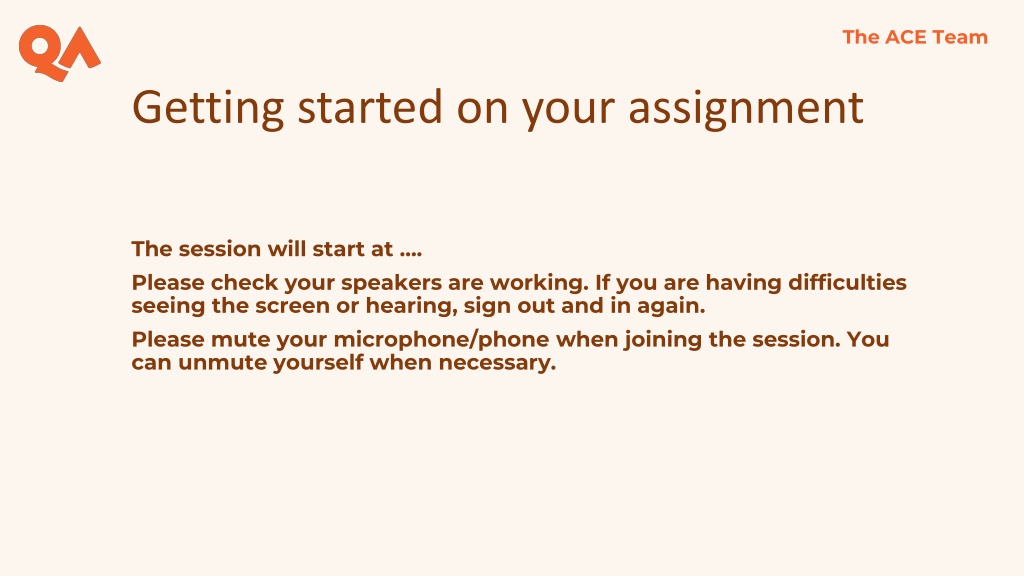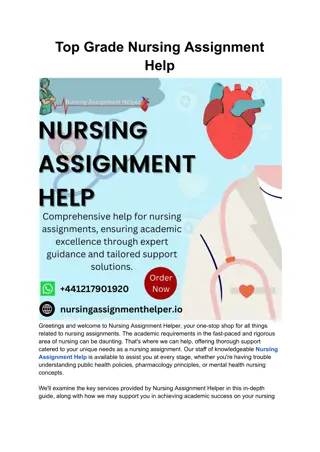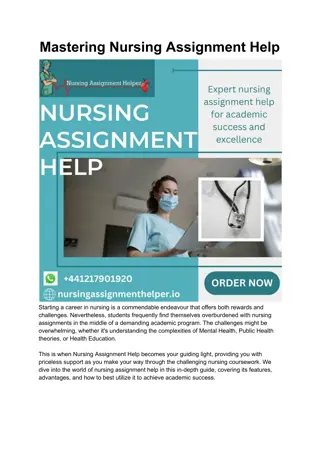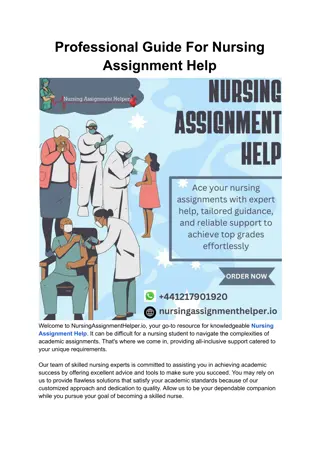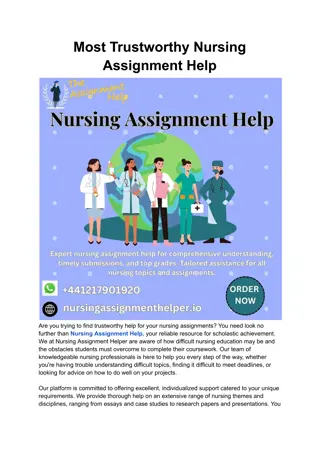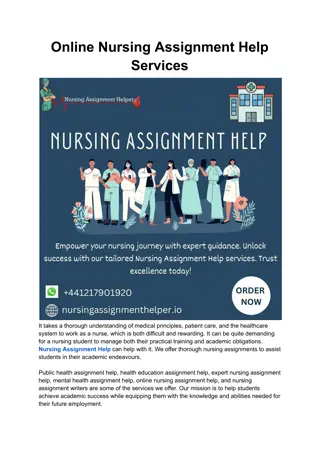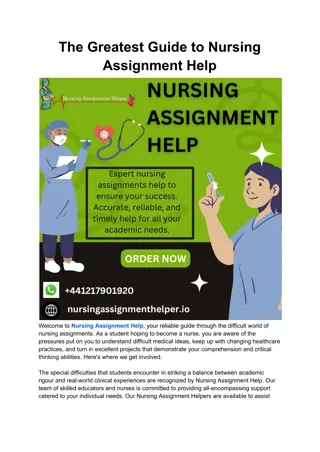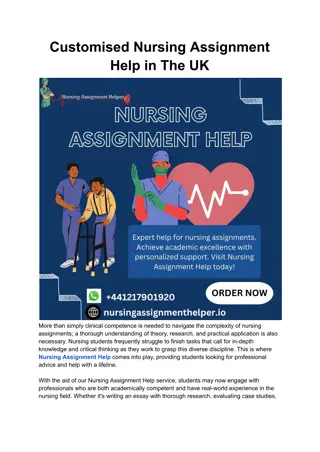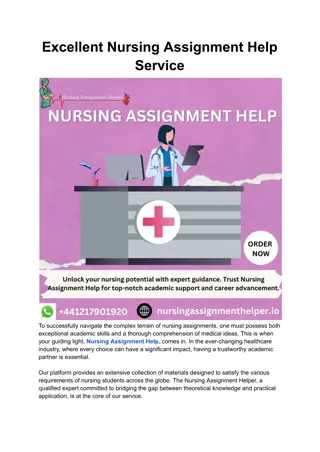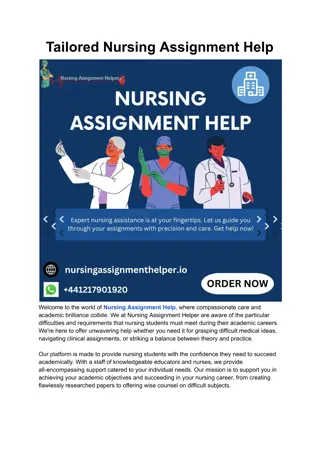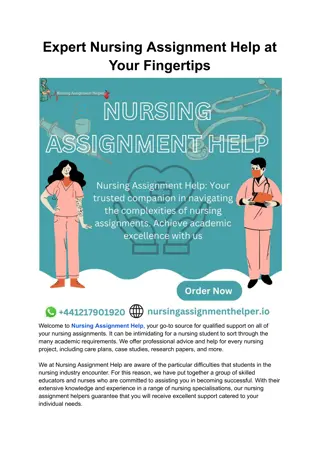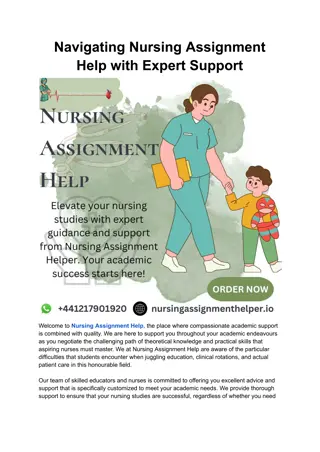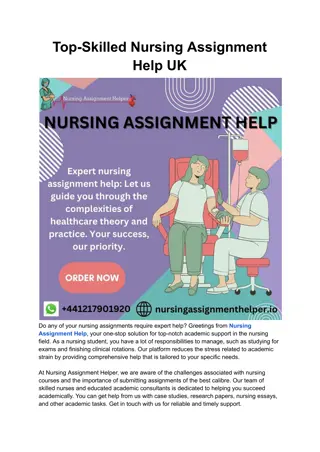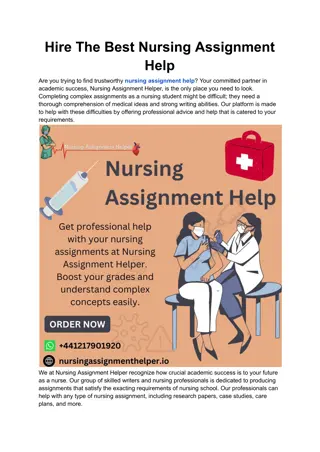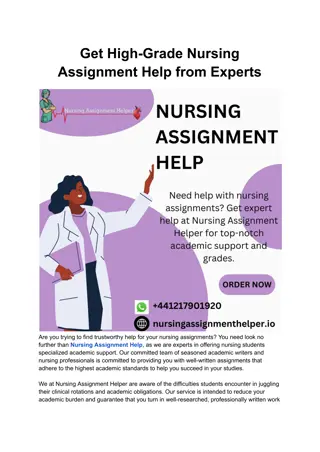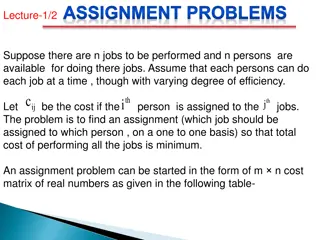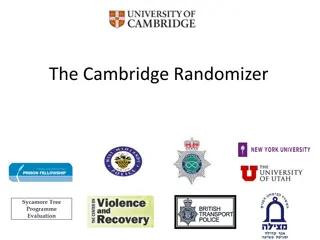Tips for Efficient Assignment Start
Learn strategies for overcoming common challenges when starting assignments, such as time management, finding information, and beginning writing. Explore tips for making the most of your time, organizing tasks effectively, and avoiding duplication of effort.
Download Presentation

Please find below an Image/Link to download the presentation.
The content on the website is provided AS IS for your information and personal use only. It may not be sold, licensed, or shared on other websites without obtaining consent from the author. Download presentation by click this link. If you encounter any issues during the download, it is possible that the publisher has removed the file from their server.
E N D
Presentation Transcript
The ACE Team Getting started on your assignment The session will start at . Please check your speakers are working. If you are having difficulties seeing the screen or hearing, sign out and in again. Please mute your microphone/phone when joining the session. You can unmute yourself when necessary.
The ACE Team What is difficult about getting started? 2
The ACE Team Today s topics Some obstacles and some possible strategies: Time Finding information Finding your thread Making a start 3
The ACE Team Common difficulties in getting started Time Missing information Finding your thread Making a start Lack of time Not sure what is expected Too many ideas / too much information Worried your text won't be good enough Panic Tiredness Looking but not finding information Don't know what to put in and what to leave out The first sentence Getting behind with the weekly reading Missed classes containing key information and guidance Don't know what the 'message' is Intending to go back and make detailed notes later Forgotten what s in the brief Duplicating effort Leaving it late to start writing 4
The ACE Team Time not enough, not good-quality Top tips? 5
The ACE Team Making the most of your time Getting organised Setting up systems, routines and files Allocating time for all stages / aspects Using available pieces of time efficiently (Rocks, Pebbles, Sand?) - - - Start early Avoid duplication of effort Have a notebook or Word doc for thoughts that occur during the day Plan times for relaxation and take them Ask for help if you need it 6
The ACE Team Making the most of your time: Rocks, Pebbles, Sand Figure 1: Image of Rocks, Pebbles, Sand time management strategy (Prabhakar, 2020) 7
The ACE Team Avoiding duplication of effort Annotated spreadsheet - For rapid location of texts you have read previously - For your reference list Take notes as you read During online taught sessions, note down times when useful discussion starts Jot down potentially useful theory / points / questions / ideas on an assignment template 8
The ACE Team Missing information Top tips? 9
The ACE Team Finding information quickly Familiarise yourself with module content, library portal, ACE home page Make the most of the assignment brief Use module discussion forums to ask questions and exchange information Ask your lecturer Keep a list of content with timings for recorded sessions 10
The ACE Team Using the assignment brief: key points Read to the end and revisit frequently Spend 5 minutes at an early stage on the marking band descriptors Attend guidance sessions Ask your lecturer if anything is unclear Don't miss opportunities for developmental comments 11
The ACE Team Finding your thread : Some approaches Creme and Lea (2008: 73 76) identify these approaches. Familiar? 'Diver writers use writing to help clarify their thinking 1 2 'Patchwork writers' work on several sections concurrently, then connect, remove, resequence material. 3 'Grand plan writers' read, then digest, then write according to a mental sense of direction. 4 'Architect writers' list ideas and points, perhaps in a mind map, before they start to write. What are the benefits and drawbacks of each of these approaches? 12
Finding the thread 2: Practical strategies The ACE Team Mind-mapping (software, paper and sticky notes) to record ideas, add further points, group, sequence, annotate e.g. padlet Recording yourself 'thinking aloud' Just start writing Do you use any approaches like this? Are they useful? What else can help? 13
The ACE Team Making a start 1 What s difficult? What can help? I've spent ages on the introduction but it still isn't right I'm worried that my ideas are not good enough I don t know for sure what I think 14
The ACE Team Making a start What's difficult? I've spent ages on the introduction but it still isn't right I'm worried that my ideas are not good enough What can help? Write another section OR write the rest of the introduction as bullet points and move on Tell others your ideas Read another source or chapter I don t know for sure what I think Write to help understand what you think Read some more Revisit your mindmap and/or notes I still don't know how to begin Outline and comment on a theory or model relevant to your topic. Can you work backwards and forwards from this, gradually building up your text round it? 15
The ACE Team What would you like to remember from today? 16
The ACE Team You might also like: More on breaking down the assignment question: Study Strategies for New Learners/Students: How to plan your assignment and manage your time - workshop slides and video guide. ACE workshops and resources on Writing Introductions and Conclusions and Writing the Main Body (Writing Assignments Structuring your work). 17
Thank you for attending the Getting Started on Your Assignment workshop today. We would be grateful if you could take 5 minutes to complete our feedback form. Via the URL here and in the Chat Box https://forms.office.com/Pages/Response Page.aspx?id=lwcinDfD- EmwhqmiSXn3KJx4- QmcBv9NnNg4SAsynGNUMDRJTEhHQ1 RYSVVMQVZCNjhBMlpMNExDTi4u By scanning the QR Code
The ACE Team References Creme, P. and Lea, M. (2008): Writing at university. [3rd edn.] Maidenhead: Open University Press. Prabhakar, M. (2020): All about OKRs. Available at: https://blogs.talentdux.com/all-about-okrs-c6938cc273d9 (Accessed: 28 October 2021). [Image] 19
